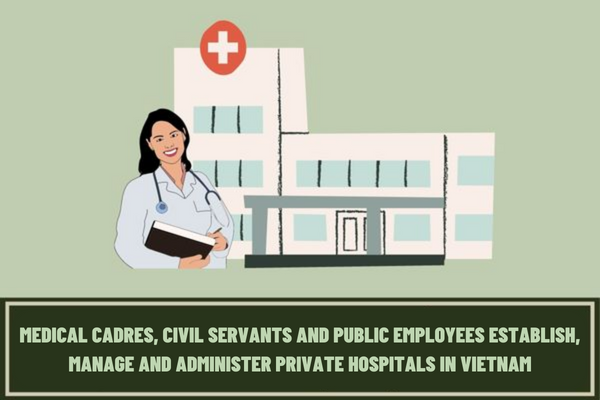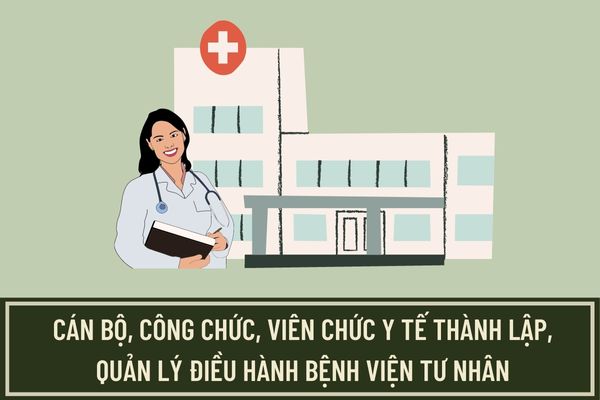Vietnam: Abolish the regulation prohibiting medical cadres, civil servants and public employees establishing, engaged in the establishment or management and administration of, private hospitals according to current regulations?
- Is it prohibited for medical cadres, civil servants and public employees to establish, manage and administer private hospitals according to current regulations?
- Are medical cadres, civil servants and public employees allowed to establish, engage in the establishment or management and administration of, private hospitals or medical examination and treatment establishments from January 1, 2024?
- What are the regulations on the responsibilities for the State management of healthcare?
Is it prohibited for medical cadres, civil servants and public employees to establish, manage and administer private hospitals according to current regulations?
Pursuant to Article 6 of the 2009 Law on Medical Examination and Treatment in Vietnam (effective until December 31, 2023), prohibitions on medical examination and treatment are as follows:
Prohibited acts
1. Refusing to provide or intentionally delaying first aid for patients.
2. Providing medical examination and treatment without a medical practice certificate or during the time subject to suspension from professional practice; providing medical examination and treatment services without an operation license or during the time subject to suspension from operation.
3. Practicing medical examination and treatment or providing medical examination and treatment services outside the scope of professional operation under a medical practice certificate or operation license, except cases of emergency.
...
13. Medical cadres, civil servants and public employees establishing, engaged in the establishment or management and administration of, private hospitals or medical examination and treatment establishments set up and operating under the Enterprise Law or the Law on Cooperatives, unless they are assigned by competent state agencies to manage and administer state-funded medical examination and treatment establishments.
14. Bribe giving, taking and broking in medical examination and treatment.
Thus, one of the prohibited acts in healthcare services according to current regulations in the 2009 Law on Medical Examination and Treatment in Vietnam is that medical cadres, civil servants and public employees establishing, engaged in the establishment or management and administration of, private hospitals or medical examination and treatment establishments set up and operating under the Enterprise Law or the Law on Cooperatives, unless they are assigned by competent state agencies to manage and administer state-funded medical examination and treatment establishments.

Vietnam: Abolish the regulation prohibiting medical cadres, civil servants and public employees establishing, engaged in the establishment or management and administration of, private hospitals according to current regulations?
Are medical cadres, civil servants and public employees allowed to establish, engage in the establishment or management and administration of, private hospitals or medical examination and treatment establishments from January 1, 2024?
Pursuant to Article 7 of the 2023 Law on Medical Examination and Treatment in Vietnam, the prohibited acts in healthcare services are as follows:
Prohibited acts in healthcare services
1. Infringe patients’ rights.
2. Refuse or intentionally delay to refer patients to emergency care services, except as defined in Article 40 herein.
3. Carry out healthcare services that do not satisfy the conditions set out in Article 19 herein.
4. Deliver healthcare services that do not fall within the scope of practice or operation permitted by competent authorities, except in case of emergency care needed, or as these healthcare services are delivered under the mobilization or dispatch decisions of competent authorities in case of natural disaster, catastrophe, group-A infectious disease or state of emergency.
5. Practice medicine at the time or place which is not stated in the registration for practice of medicine, except as specified in clause 3 of Article 36 herein.
6. Fail to comply with regulations on professional and technical expertise in healthcare; use any professional method and technique, or medical equipment that has not been approved by competent authorities.
7. Prescribe medications that have not obtained marketing authorization as provided in law on pharmacy in healthcare.
8. Commit the act of harassment in the delivery of medical services.
9. Prescribe patients drugs, technical and medical equipment services; suggest referral to other medical establishments to patients, or commit other acts for personal gain.
10. Erase and tamper with medical records in order to falsify information on medical examination and treatment, or create fraudulent medical records or other documents showing medical examination and treatment results.
11. Any practitioner sells drugs in any form, except in the following cases:
a) Traditional medicine doctors, traditional medicine physician assistants or traditional medicine herbalists who sell traditional medications;
b) Holders of folk remedies who sell drugs prescribed according to folk remedies under their registered ownership.
12. Drink alcohols, beers and other alcoholic beverages; use narcotics; smoke tobaccos or cigarettes at medical establishments or while on duty.
13. Use any form of superstition in the distribution of medical services.
14. Refuse to participate in rendering medical services in case of a natural disaster, calamity, group-A infectious disease or a state of emergency according to the mobilization or dispatch decision of the competent body or person, except as defined under the regulatory provisions of point a and b of clause 3 of Article 47 herein.
15. Any medical establishment provides healthcare services if it
a) does not hold any operating license;
b) is under suspension of its operations;
c) delivers healthcare services that do not fall within the scope of permitted professional activities, except in case of emergency, or as these healthcare services are delivered under a mobilization or dispatch decision of the competent authority in response to a natural disaster, catastrophe, group-A infectious disease or state of emergency.
16. rents, borrows; leases or lends out practicing or operating licenses.
17. Misuse a practitioner's image and status to speak about, propagate and encourage patients to use unrecognized medical tests or therapies.
18. Infringe upon the life and health, or offend the honor and dignity, of practitioners and other people working at medical establishments, or damage or sabotage medical establishments’ property.
19. Prevent patients who are subject to the involuntary treatment requirement from entering medical establishments, or intentionally render involuntary treatment on people who are not subject to the involuntary treatment requirement.
20. Advertise beyond the scope of practice or professional activities approved by a competent authority; abuse medical knowledge to falsely advertise medical services.
21. Publish information not yet validated by competent authorities that medical incidents are ascribed to medical practitioners or medical establishments.
Thus, the new provisions in Article 7 of the 2023 Law on Medical Examination and Treatment in Vietnam have supplemented and amended many prohibited acts in healthcare services.
At the same time, officially abolish the regulation prohibiting medical cadres, civil servants and public employees establishing, engaged in the establishment or management and administration of, private hospitals or medical examination and treatment establishments set up and operating under the Enterprise Law or the Law on Cooperatives.
What are the regulations on the responsibilities for the State management of healthcare?
Pursuant to Clause 2, Article 5 of the 2023 Law on Medical Examination and Treatment in Vietnam, the responsibilities for the State management of healthcare shall be subject to the following regulations:
- The Government shall be responsible for the uniform state management of healthcare;
- The Ministry of Health shall be held accountable to the Government for its state management of healthcare;
- The Ministry of National Defense and the Ministry of Public Security shall, within the range of their tasks and powers, perform the state management of healthcare, and take responsibility for organizing the healthcare systems and services under their jurisdiction pursuant to this Law;
- Ministries and Ministry-level agencies shall, within the ambit of their duties and powers, have the burden of cooperating with the Ministry of Health in performing the task of State management of healthcare;
- People’s Committees at all levels shall perform the state management of healthcare in areas falling within their relevant remit.
The 2023 Law on Medical Examination and Treatment in Vietnam takes effect from January 1, 2024.
LawNet
